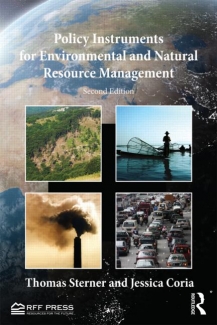FILTER
Displaying 171 - 180 of 406 publications
In this paper, we analyze the effects of the choice of price (taxes) versus quantity (tradable permits) instruments on the policy response to technological change. We show that if policy responses…
24 January 2012 | Peer Reviewed | SwedenA large part of the literature analyzing the links between biodiversity conservation and community development assumes that nature-based tourism managed by indigenous communities will result not only…
21 December 2011 | Peer Reviewed | Central America, SwedenThe authors studied the potential tradeoff between countries’ investments in mitigation versus adaptation to climate change. Mitigating greenhouse gases may be a public good, but adaptation to climate…
30 November 2011 | Peer Reviewed | Sweden, South AfricaGlobal climate change stands out from most environmental problems because it will span generations and force us to think in new ways about intergenerational fairness. It involves the delicate problem…
24 February 2012 | Peer Reviewed | SwedenMuch of the improvement in living standards in developed and developing countries alike is attributable to the exploitation of nonrenewable and renewable resources. The problem is to know when the…
22 February 2012 | Peer Reviewed | SwedenMicrocredit schemes have become a popular means of improving smallholders’ access to credit and making long term investment possible. However, it remains to be explored whether the current microcredit…
20 February 2012 | Peer Reviewed | SwedenThis book by Thomas Sterner and Jessica Coria is an attempt to encourage more widespread and careful use of economic policy instruments. The book compares the accumulated experiences of the use of…
20 January 2012 | EfD/RFF Book | SwedenWith contingent valuation, both the goods being valued and the payment vehicles used to value them are mostly hypothetical. However, although numerous studies have examined the impact of experience…
22 December 2011 | EfD Discussion Paper | SwedenResearchers using stated preference (SP) techniques have increasingly come to rely on what we call "hypothetical baselines". By this we mean that respondents are provided with a description of a…
22 December 2011 | EfD Discussion Paper | SwedenGlobal climate is changing. This fact is supported by robust scientific evidence, and there is no real doubt that the main reason is the increased concentration of greenhouse gases in the atmosphere…
9 December 2011 | Book Chapter | Sweden